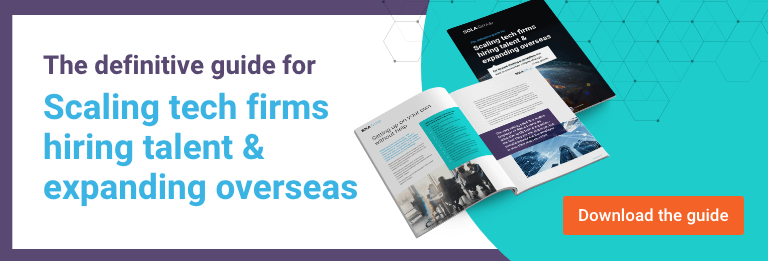"Out of your vulnerabilities will come your strength" – Sigmund Freud. International expansion leaves you vulnerable, and your board will be probing to find the weaknesses in your strategy. Of course, you've already planned for everything they will definitely throw at you, but having credible answers to some of their more specific questions will be sure to impress.
Here are several of the most likely questions about expanding business internationally your board should want to know and some suggestions about how you might turn vulnerabilities into strengths.
1. What are the risks and opportunities of expanding business internationally?
Of course, the biggest risk is failure, which often happens when businesses burn through too much cash without getting results fast enough. International expansion inevitably involves a major (often massive) increase in expense and the need to take significant financial risks. Not only is there a risk of the business making a loss at the beginning of an international expansion project, the cost of the expansion itself—in both time and money—can be enormous.
However, while there will always be risks, there are ways to nullify them and simultaneously reduce the resources you need to expand internationally. The board will undoubtedly want to know how you plan to do this.
First, you could reduce the time it takes to expand (thus reducing the overhead on your internal resources) by using an expansion partner with expert local knowledge of the target country's employment landscape and legal system. The right partner will be able to ensure you have the best team in place, are legally compliant, and adhere to foreign employment law and regulations.
Second, investing in physical infrastructure in an untested territory comes at a high cost. Renting space in a prime location such as Dublin, London, or Berlin and then furnishing the office is expensive. However, a virtual subsidiary can offer all the benefits of having your own entity abroad without a substantial initial investment.
Last, the country to which you decide to expand will be a determinate factor in reducing risk and increasing the chances of success. In the EMEA market, strategically important business-friendly countries with access to large markets are a good bet: countries such as Ireland, the UK, Germany, and the UAE.
2. Will you send a team from head office or hire abroad?
You already have the best team in place at head office. They have all proven themselves and contributed to your US expansion. So it will be tempting to tell the board that you will send some of your best.
But if you do send your best, where will that leave your national operation and your main revenue drivers? Sending people from head office will put much pressure on the remaining staff as well as those you sent abroad, who will have to adapt to a whole new framework.
Stretching the system you have in place may not be the best idea. Also, there's a chance that cultural issues and the new market may not suit your best national employees.
An optimal solution could be to work with an executive search firm with intimate knowledge of the local market and long-term relationships with top talent in your industry. Consultants who are experts in their niches will be able to find the right candidates and assemble the right teams quickly and effectively. They can use their local knowledge to find and engage with passive candidates whom they can attract by selling your company and offering the right benefits package for the market.
The result: you will have your best teams in place at home and abroad.
3. What cultural differences need to be considered?
The dangers of ignoring cultural differences are common knowledge. For example, when Walmart flopped in Germany, the problem was attributed to US corporate management and retail culture being imposed but rejected. So it's understandable that the board will want to know how you plan to avoid a similar fate.
Cultural traditions and beliefs affect everything from sales techniques to customer tastes. Therefore, making sure you speak the same language as the target market is essential. To be successful, sometimes changing your whole approach and technique is necessary—ensuring you understand the people in the local community and what they value.
For instance, acceptable sales models vary between countries. Relationships have a high cultural value in some places, whereas others prefer a direct sales approach.
While US companies generally understand there are cultural differences with ‘very different’ countries such as Japan, they often presume that similar countries such as the UK and Ireland share the same culture. These countries might share the same language but have very pronounced cultural differences.
As well as reducing cultural insensitivities, comprehending the local culture will also provide insights into the competition and how they operate. After all, you do not want to offer a service that already exists in the market, so understanding the competition will allow you to refine your business model and make your company more competitive and niche.
Not wanting to commit the same mistake as Walmart, perhaps engaging with a local partner and employing local staff will provide you with the cultural knowledge you need for the business to be a success.
4. How will you protect the company’s Intellectual Property?
Protecting the company’s IP is one of the board’s most important obligations, so it will want to ensure that the international expansion plan has safeguards in place.
Opening your own overseas entity and developing international intra-group company agreements by which your IP is transferred back and forth between the parent company and subsidiary is one way to protect your IP. However, taking this expensive route (which is essential for a standard, direct method of growth) at the beginning of your international expansion journey is costly and, therefore, risky.
The board may also be aware of the pitfalls of EoR and PEO solutions—especially relating to the potential inevitable loss of IP. A safe international expansion solution will allow US companies to open a virtual subsidiary abroad that acts as a contractual trust established to hold and manage overseas assets for the parent company (which becomes the beneficiary). Using a trust model, the virtual subsidiary holds the client company's IP in the trust; however, it is not the final owner of that property. And that virtual subsidiary employs an international IP expert, deploying them for your benefit.
5. How well do you understand the laws, rules, and regulations in the target country?
The US is an employer-centric country with far fewer employee protections than European countries, for example. Boards will be wary of cases such as a recent one when a US company fired an employee for refusing to leave his webcam on all day, subsequently being sued and having to pay out more than $70,000. And they will want to be sure you have a clear understanding of the rules and regulations in the target country to ensure that your company is not subject to lawsuits.
However, it is unrealistic for you or your local legal counsel to have an expert understanding of foreign legal systems. If legal systems vary significantly between states, imagine how different legal systems are in EMEA countries.
Partnering with a local firm that can offer expert guidance on all employment law matters, from setting up a business to employment contracts to paying the right amount of tax, is the safest way to address regulatory divergence and ensure compliance.
Conclusion
It’s your board’s job to grill you on your international expansion strategy. Although you cannot predict everything they might ask, they are highly likely to ask the five questions above. And while each question has several possible answers, there is one common solution that could reduce risk and increase success: a local expansion partner.
Any party with whom you decide to engage should benefit your business by providing three essential structural elements: They must be able to identify and attract top talent. They must be able to protect you legally. And they must be able to provide you with a virtual subsidiary that looks after, protects, and defends your interests until you decide to open your own entity.


